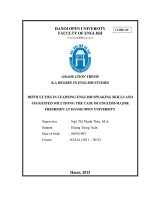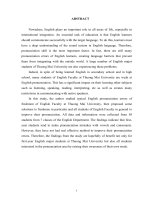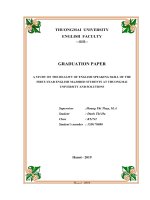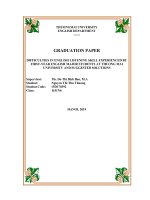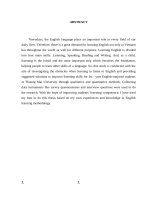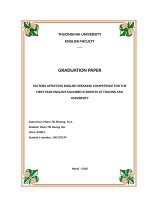DIFFICULTIES IN LEARNING VOCABULARY OF ENGLISH FACULTY STUDENT AT THUONG MAI UNIVERSITY
Bạn đang xem bản rút gọn của tài liệu. Xem và tải ngay bản đầy đủ của tài liệu tại đây (528.42 KB, 41 trang )
THUONG MAI UNIVERSITY
FACULTY OF ENGLISH
----------
GRADUATION PAPER
TOPIC:
DIFFICULTIES IN LEARNING VOCABULARY OF ENGLISH FACULTY
STUDENT AT THUONG MAI UNIVERSITY
Advisor
: Nguyen Thi Thuy Chung
Student
: Truong Thi My Hoa
Class
: K53N1
Student Code
: 17D170013
Ha Noi 2021
ABSTRACT
No one denies the importance of English in the present time as global language.
It is clear that English has become more and more dominant around the world.
Actually, in some countries it is used as the mother tongue and, other countries learn
it as second language in their schools. There is no doubt that English is language of
communication between people from different cultures.
As for as we are concerned, studying a language cannot be separated from
studying vocabulary. Yet it is true that the vocabulary is the focus of language. It is in
words that sound and meaning interlock to allow us to communicate with one
another. Besides, vocabulary really plays an important role because it appears in
every language skill.
However, it is not easy to study perfect English vocabulary, especially business
vocabulary. Almost students of the Faculty English at Thuongmai University often
face up with some problems in learning vocabulary at first because it is difficult to
memorize a new word with its meaning, spelling and pronunciation. Therefore, I
decided to conduct a survey to identify common difficulties in learning vocabulary, in
order to find effective solutions to help students learn better in this module.
This is the researcher’s proposal, has not been specifically applied in practice. I
would like to be given the steps to conduct the research, and at the same time predict
the results of the research. Due to the limited implementation time, there are
unavoidable errors in the implementation process, the researcher sincerely hopes to
receive the sympathy of the teachers.
2
ACKNOWLEDGEMENTS
To Teachers in Thuong Mai University!
Especially, Mrs Nguyen Thi Thuy Chung!
In fact, there is no success that is not attached to the support or help, whether
directly or indirectly by others. During the time since I started studying in
Thuongmai university until now, I have received a lot of attention and help from
teachers, family and friends. First of all, I would like to express my deep gratitude to
the teachers of English Faculty in particular and all teachers of Thuongmai
University in general. By your knowledge and dedication, you give me valuable
knowledge throughout the study period.
In addition, I would like to express my deepest attitude to my supervisor, Mrs.
Nguyen Thi Thuy Chung, who is the English lecturer of Business English Faculty, for
her valuable guidance, critical feedback, and enormous encouragement. Without her
incessant support, this research cannot come to this successful closing stage.
Last but not least, I also want to express my great appreciation to my family and
friends who are always by my side during the part school years. Your encouragement
has made me stronger in this period of life.
Finally, I wish all teachers good health and success in teaching careers.
Sincerely,
Truong Thi My Hoa
3
TABLE OF CONTENT
4
LIST OF TABLE AND FIGURES
5
CHAPTER 1: OVERVIEW OF THE STUDY
1.1. Rationale
Vocabulary plays an important role in language learning. Vocabulary is also an
essential skill for learning to read, speak, write and listen. Without sufficient
vocabulary, people cannot communicate and express their feeling both in form of
spoken and written effectively. The more people master vocabulary, the more they
can speak, write, read and listen as they want. Wise people know how to enrich their
vocabulary through reading books and studying, thereby they can acknowledge more
about your life or this world, and upgrade themselves. “Words are one of our chief
means of adjusting to all the situations of life. The better control we have over words,
the more successful our adjustment is likely to be.” (Bergen Evans, 1904-1978,
American writer and educator). Hence, it is paramount to enlarge your vocabulary in
your mother tongue or particularly in a language that you are learning.
There is a fact that, Vietnamese English learners are better at grammar than
native speaker but the others skills are not good. The dominance of structures made
people disparage the role of vocabulary. Wilkins in Thornbury (2004: 13) states that
without grammar very little can be conveyed, without vocabulary nothing can be
conveyed. It means that even someone has good grammar but it will be useless if
they do not know lots of vocabularies. In addition, it is supported by Ur (1996: 60)
that vocabulary is one of important things to be taught in learning foreign language
because it will be impossible to speak up without variety of words. Those statements
imply the importance of teaching vocabulary as a foreign language.
In the context of Thuongmai University which leads in the fields of commerce,
students in the faculty of English are trained in commercial English and a
compulsory subject for non- majored students. Fortunately, I acknowledged the
importance of vocabulary as a significant aspect in foreign language methodology to
accelerate my learning English journey. Having spent about 4 years studying
Business English, I have got many experiences and also realized many obstacles that
push me back and restrain me to move forward. Unlike general vocabulary used in
daily life, moreover, Business English vocabulary is truly a big hindrance. The
6
problems may be listed, for example, the amount of Business vocabulary is enormous
that is overwhelming learners, it is very hard to remember those and especially
students do not know how to use it properly. Another matter, ironically, found out
through a brief interview with my peer studying the same course, is that they do not
remember and can’t use some Business terms without searching for it on the Internet.
Hence, these matters inspire me a real desire to conduct this student to figure
out the problems encountered when learning Business English vocabulary and find
solutions to help learners who are learning or want to learn Business English know
how to find the perfect method. This result, in particular, can be a guideline for
students in the faculty of English at Thuongmai University.
1.2 Previous studies
The researcher has found some previous studies that related with this research.
The first study was conducted by Saniyah (2011). The title is “Students and Problems
in learning English Vocabulary”. The researcher used descriptive research as the
research design. The instruments used in this research are interview and
questionnaire. The results of this research showed that there are some problems in
learning vocabulary that faced by English Department students of IAIN Sunan Ampel
Surabaya. The errors generally grouped into some categories that were words classes,
homonym, homophones, homograph, polysemy and word formations. Meanwhile,
the common problem that found by the researcher is the students’ problem in
remembering the new words.
The second previous study is conducted by Ningrum (2015) entitled “Students’
Problems in Learning Vocabulary at Eighth Grade in One of Junior High School in
Jambi”. The researcher used mixed method research as the research design. The
researcher used test and interview as the instruments of this research. The researcher
only chooses 3 students who got the lowest score in the test. The findings of this
research showed that the eighth grade students of SMP N 10 Jambi were categorized
into various categories.
Next study is conducted by Rohmatillah (2014) entitled “A Study on the
Students’ Difficulties in Learning Vocabulary”. In this research, the researcher used
qualitative research. Interview and questionnaire were the instruments that used for
7
gaining the data. The findings from this research showed that there are some
difficulties that faced by the students from the first semester at IAIN Raden Intan
Lampung; (1) most of the students find the difficulty in pronouncing the words, (2)
they were also difficult in writing and spelling the words, (3) the other difficulty was
the grammatical form of the words, (4) most of the students face the difficulties in
choosing the appropriate meaning of the words and (5) they were still confused in
using the words correctly and, (6) most of the students were also confused when they
found idiomatic meaning of the words.
From those previous studies above, this research was different. The researcher
used qualitative method to collect the data from the participants. In addition, the
researcher also focused on the students’ strategies in learning vocabulary.
1.3. Aims of the study
This study aims at the following objectives:
1. Investigate the problems faced by English majored Students at Thuongmai
University in learning Business English vocabulary.
2. Recommend strategies that can help learners minimize problems and find out
the effective ways to learn Business English vocabulary.
1.4. Research Subjects
This study is about the vocabulary learning difficulty used by fourth-year
students majoring in English at Thuongmai University.
1.5. Scope of the study
This study is limited to the area of investigating in Business English vocabulary
faced by fourth year students in Thuongmai University. More importantly, this survey
tries to serve the purpose of figuring out the most common problems in the students’
Business vocabulary learning and finding possible solutions to help learners learn
vocabulary successfully.
1.6. Research methodology
This study adopts a quantitative approach and a qualitative approach to find out
the problems that Business English learners encounter the vocabulary learning
process. Besides, it is helpful to list out other obstacles in Business English
vocabulary. The quantitative approach to gathering information focuses on describing
8
a phenomenon across a larger number of participants thereby providing the
possibility of summarizing characteristics across groups or relationships. Moreover,
the qualitative approach to gathering information focuses on describing a
phenomenon in a deep comprehensive manner. This is generally done in interviews,
open-ended questions, or focus groups. ( Jean Rhodes, 2014).
1.7. Organization of the study
There are four main chapters in the study
Chapter1: Overview of the study
In this chapter, all the general information is listed as a foundation for the
research such as Rationale, Previous studies, aims of the study, Research subjects,
Scope of the study and Research methodology.
Chapter 2: Literature review
In this chapter, all the theories related to this research will be mentioned to help
readers understand more about the results of the research.
Chapter 3: Research findings and discussions
This chapter divided into two parts, there are research methodology and
research findings and discussions.
In research methodology, researchers will show the procedure to collect all the
data for this survey and how to analyzed the data. Any tools or materials are used in
the research and the rationale for choosing these methods.
In research findings and discussions, it shows all results that are received and
added with some discussion through the survey. Based on the data collection from the
survey questionnaire, the issues will be analyzed in depth to provide accurate
information about some common hindrance when learning Business English
vocabulary. Major findings are identified. Suggest some solutions which are expected
to address these problems faced by learners. Additions, some advice or ways to have
the best learning method are suitable for each person.
Chapter 4: Recommendations and solutions
This chapter identifies some solutions to improve teaching and learning English
in general, and teaching and learning English vocabulary in particular at Thuongmai
University, as well as the limitations of the study and suggestions for further study.
Also, “References” and “Appendix” will be listed on the study's last pages.
9
CHAPTER 2: LITERATURE REVIEW
2.1. Theoretical background of vocabulary
2.1.1. Definition of vocabulary
Learning a new language cannot be separated from vocabulary. Meaning that in
learning a new language people have to know its vocabulary. Vocabulary can be
defined in various ways. Experts have proposed some terms about vocabulary.
According to Richards and Renandya (2002: 255), vocabulary is a core component of
language proficiency and provides much of the basis for how learners speak, listen,
read and write. Without an extensive vocabulary and strategies for acquiring new
vocabulary, learners often achieve their potential and may be discouraged from
making use of language learning opportunities around them such as listening to the
radio, listening to the native speaker, using language in different context, reading or
watching television.
The other definition of vocabulary states from Hatch and Brown (1995: 1), they
say that vocabulary refers to a list or set of words for a particular language or a list or
set of words that individual speakers of language might use. Hatch and Brown
(1995:1) also state that vocabulary is the only system involved of alphabetical order.
Ur (1994: 60) defines vocabulary as the words we teach in the foreign language.
In addition, Brown (2001: 377) views vocabulary items as a boring list of words that
must be defined and memorized by the students, lexical forms are seen in their
central role in contextualized, meaningful language. Richard in Schmitt (1997: 241)
also states that knowing a word meaning knowing how often it occurs, the company
it keeps, its appropriateness in different situations, its syntatic behavior, its
underlying form and derivations, its word associations, and its semantic features.
Vocabulary is central to second language (L2) acquisition. As McCarthy (1990:
140) states that without words to express a wider range of meanings, communication
in an L2 just cannot happen in any meaningful way. Nation in Schmitt (2000: 5)
proposes a list of the different kinds of knowledge that a person must master in order
to know a words: the meaning of word, the written form of the word, the spoken form
of the word, the grammatical behavior of the word, the collocations of the word, the
register of the word, the association of the word, and the frequency of the word.
10


